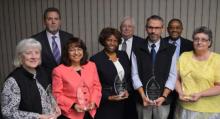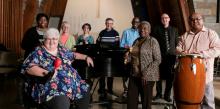Story by Jacquie Bokow
Women attending the Potomac Conference's Capital Memorial church's Women's Ministries Prayer Breakfast were recently challenged to live her "BEST" life at the church in Washington, D.C. Kathleen Coleman, Faith Community Health Network coordinator for Adventist HealthCare, spoke to the room full of women after a sumptuous catered vegetarian lunch. BEST stands for:







 race Outlet en Reading, Pennsylvania y Marquis Johns, pastor principal de la iglesia de Filadelfia Norte, serán algunos de los presentadores.
race Outlet en Reading, Pennsylvania y Marquis Johns, pastor principal de la iglesia de Filadelfia Norte, serán algunos de los presentadores. 


